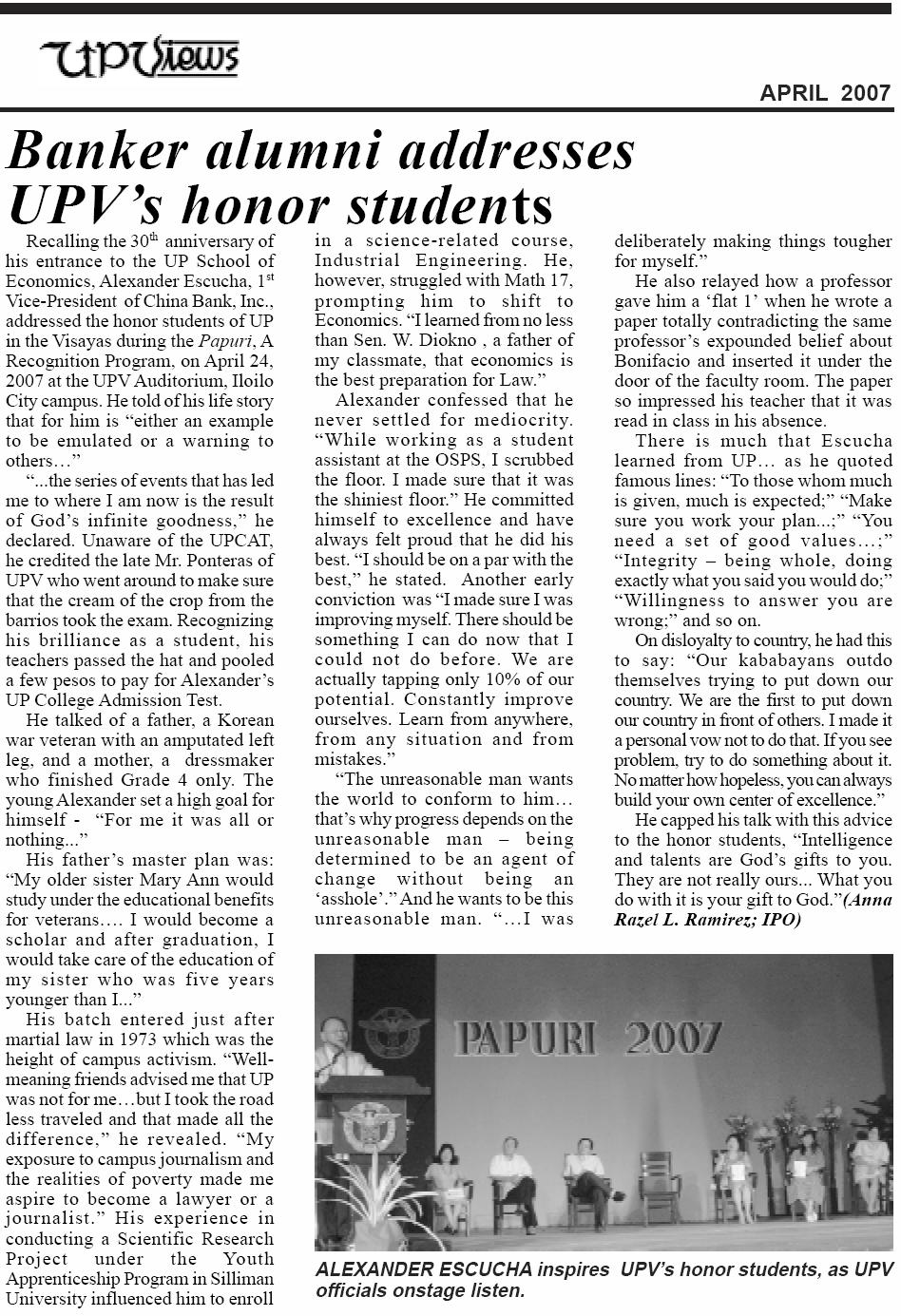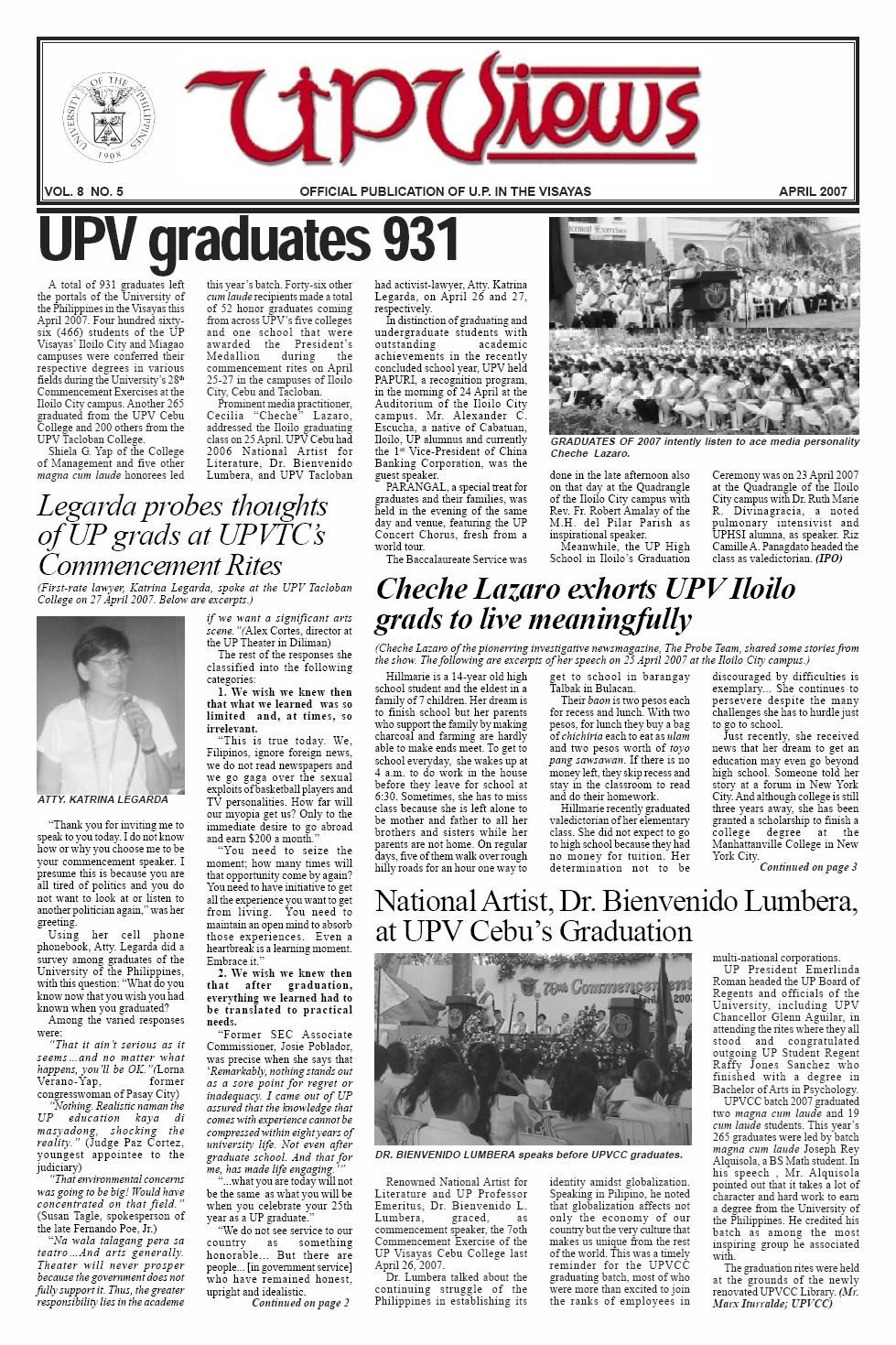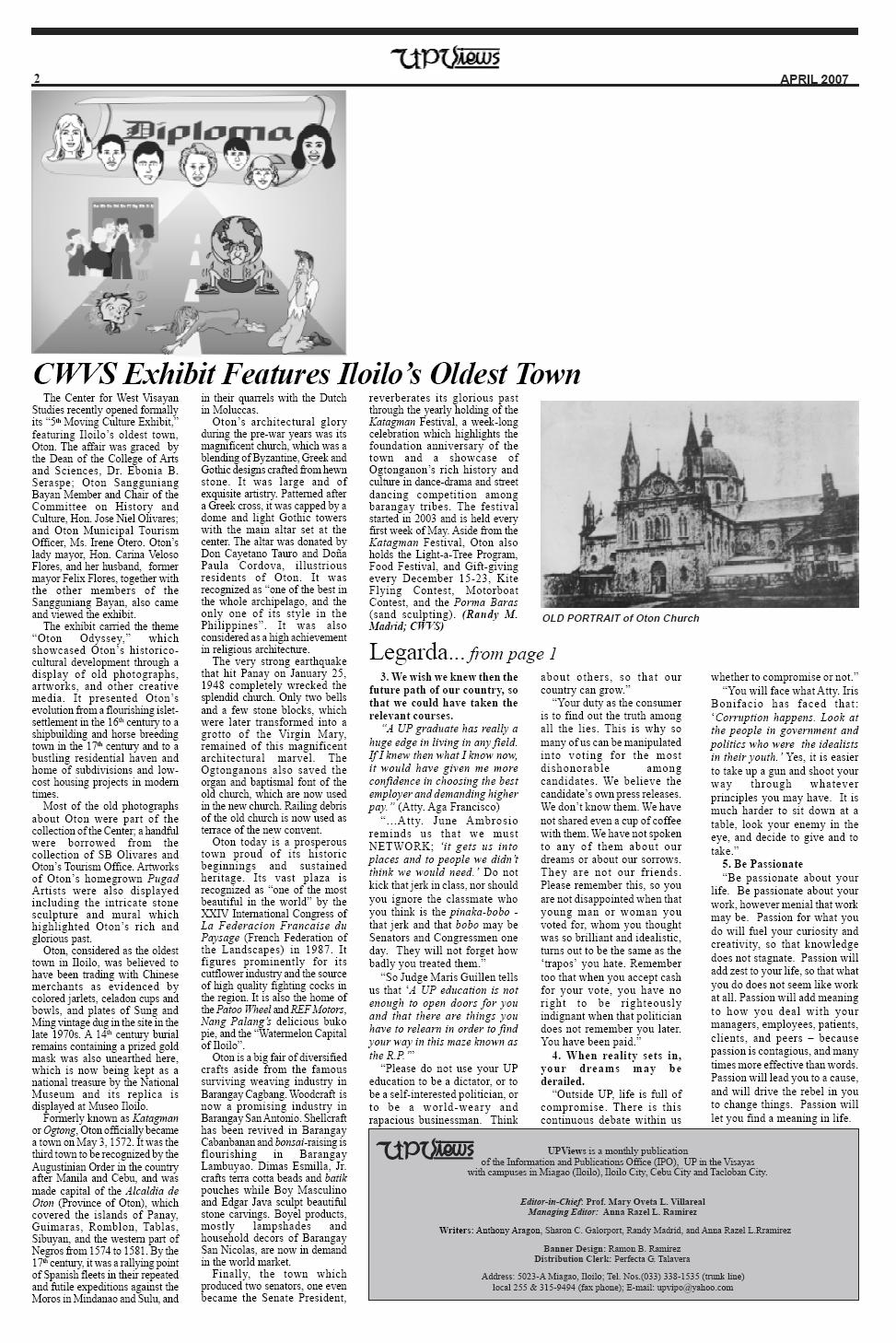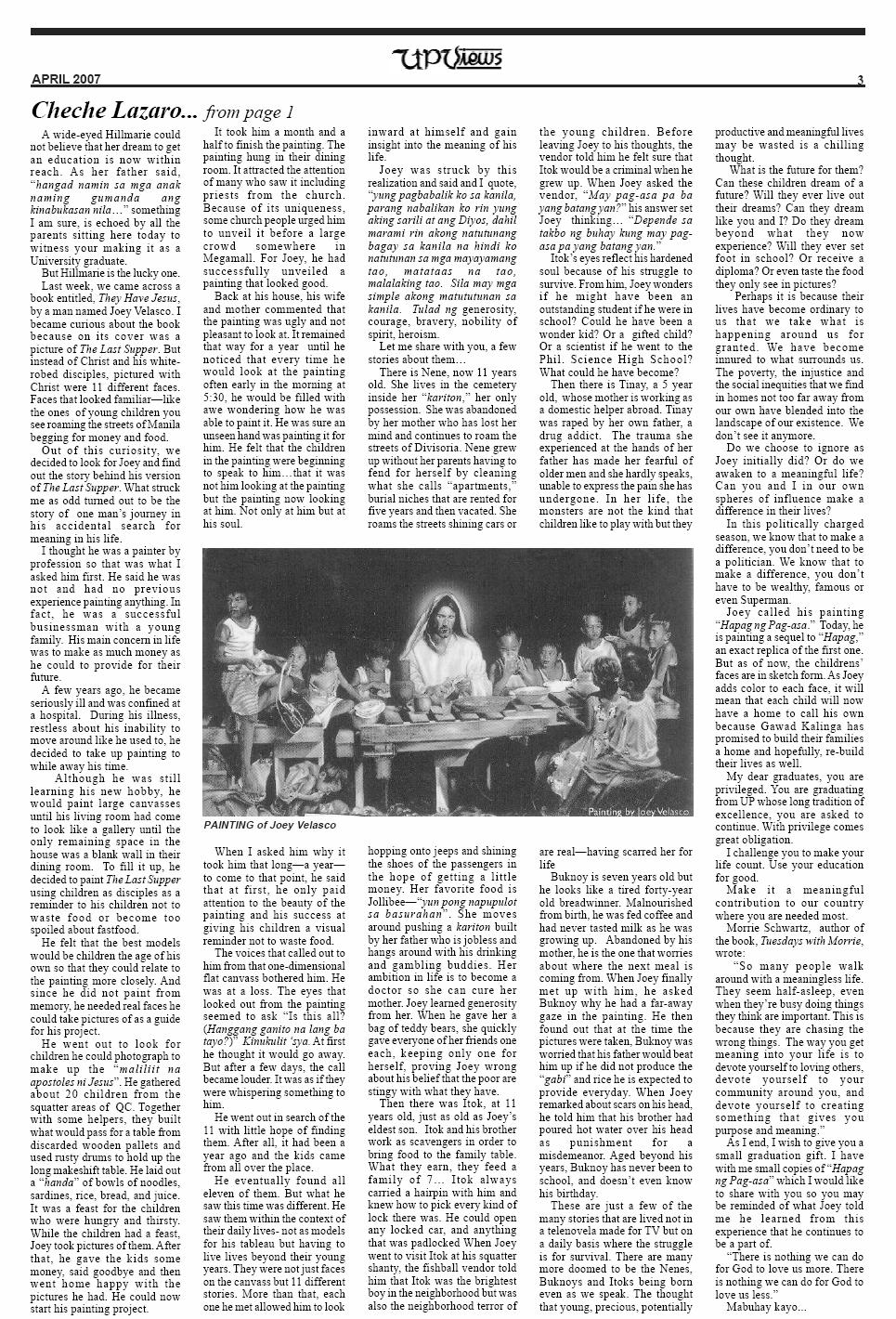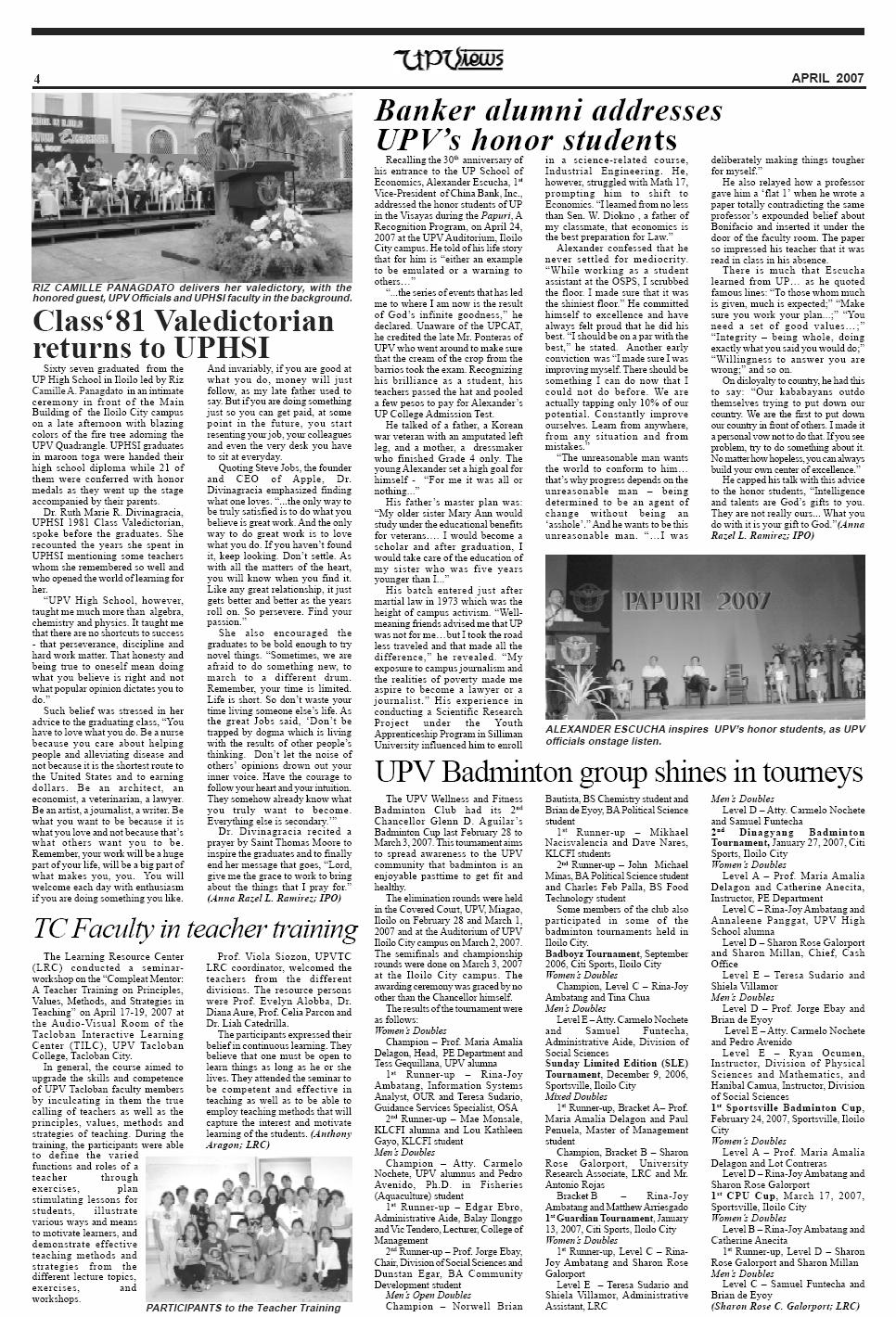Alex Escucha's Remarks at the UPV Papuri 2007
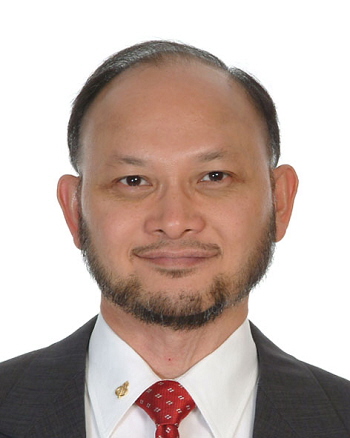
Alexander Escucha
Valedictorian, CNCHS Class 1973
First Vice-President, China Banking Corporation
Alexander C. Escucha serves as the Head of Corporate Planning Division at China Banking Corp. and its First Vice President since 2002. Mr. Escucha served as the First Vice President of Corporate Planning Division at China Banking Corp. since September 2002. He joined China Banking as Vice President in 1994. Mr. Escucha served as the Corporate Information Officer and Secretary of China Banking Corp. He has been involved in the banking industry for more than 5 years. Prior ... to joining China Banking Corp., he was Vice President of The International Corporate Bank. He was the President of the Corporate Planning Society of the Philippines (CPSP) in 1989 and President of Marketing Association of the Philippines (BMAP) from 1998 to 1999. Since 2005, he was the President of the Philippine Economic Society (PES) and concurrently Chairman of the Federation of ASEAN Economic Associations (FAEA). He serves as a Director of TMBC/China Bank Savings, Inc. He serves as a Director of Manilabank. Mr. Escucha holds a Bachelor of Arts degree in Economics cum laude from the University of the Philippines.
|
LIFE’s LESSONS
Remarks at the PAPURI 2007
UP Visayas Recognition Day
24 April 2007
Fellow UP alumni, honor students and your proud families, friends, ladies and gentlemen: Maayong aga sa tanan!
First of all, I wish to express my deepest thanks to the UP Visayas community for giving me this singular honor of addressing this distinguished crop of honor students and achievers on this your Recognition Day or Papuri. It is of particular significance for me personally, as it marks the 30th anniversary, almost to the day, of my own graduation from the UP School of Economics in April 1977. It is not a source of pride for me to recall that our Commencement speaker that year was none other than Imelda Marcos, which of course ensured that there was tight security on campus grounds that day. My abiding memory of that day was that many of us among the graduating class wanted to stand and shout with our small voices of protests, but somehow were cowed into silence by the sight of heavily armed marksmen along the top of Quezon Hall. But I digress.
Secondly, it is so gratifying for me to be able to come back and relive the memories of my college days that started in the campus of UP Iloilo. It is such pleasure to meet former classmates and friends who have distinguished themselves within the UP Community, such Dean Joy Cababasay Lizada (College of Management), Dean Luzette Teruel (College of Food Technology), Arts and Sciences College Secretary Nera Samaniego Katalbas, and my kasimanwa from Cabatuan Dr. Rodelio Subade. I am glad to say that knowing them is my claim to fame.
To all the honor students and achievers as well as members of your families here present please accept my heartiest congratulations to all of you on your achievements. It is good to note that you now have this recognition event. In contrast, all we had during our college days was a piece of white paper on the bulletin board listing the college and university scholars and those who made it to the dean’s list. For this occasion, I was asked to give an inspirational talk to the honorees which, I understand from Dr. Subade, comprise about 10% of the student population. Off hand, I have two quick reactions to this:
First, since you are already honor students and achievers in your own right, I am not sure whether there is really any value added in what I could say to inspire you more. Perhaps, it would be better for me to talk to the other 90% who are not honor students and who probably need the “inspiring” and motivating more than you do.
Second, instead of attempting to inspire you, I propose to simply just tell you my own little story. A wise man once said that your life story, however it is lived, is always a lesson to others – either as an example to be emulated or as warning to others. Hopefully, we will all have more instructive lessons than cautionary tales.
Looking back at the last 30 years, I can only conclude that the series of events that led me to where I am now is the result of God’s infinite goodness. For one, there were several logical reasons why I should not have gone to UP for my college education:
One, I was not even aware of the UP (College Admissions Test) CAT schedule and did not plan to take the exam, except that then UPI College secretary Moises Fonteras then took the time and effort to literally go to the various high schools in the various towns of Iloilo province to encourage the top students of each school to take the UPCAT on a specially scheduled weekend, way after the regular test dates. We did not have the money to pay for the application fee, so my fourth year class adviser and English teacher Miss Consuelo Piccio took it upon herself, on the spot, to pass the hat among the teachers and staff at the Cabatuan National Comprehensive High School (CNCHS) to raise the money. So that was how I came to take and pass the UPCAT, and according to Mr. Fonteras I actually scored quite high in the test and ended at no. 3 overall.
Two, UP was the last school I should have enrolled in if I were to make sure that I finish my course under the State Scholarship program, a scholarship program for “poor but deserving” students created by a law authored by Senator Jovito Salonga. The definition of “poor” meant a family income of not more than P10,000 a year – a requirement we easily met, as the pension of my father, who was a disabled Korean War veteran with an amputated left leg, was P60 a month or P720 a year. My mother, who finished only grade four but was full of wisdom and more courage, was actually the one making ends meet for our family through her work as a dressmaker. There were 2 state scholars for every province or city selected thru competitive exams, and you could keep your scholarship as long as you maintain an average of 2.5 without a failing grade in any subject. This requirement applied regardless of the school and there was no allowance for “degree of difficulty” in schools, like they have in diving competitions, so the state scholars studying in UP of course had the highest mortality rate compared to other schools. The probability of losing my scholarship was obviously very high in UP compared to other schools. For me and my family, it was all or nothing, because I had no alternative way of funding my college education should I lose my scholarship. When I was in grade 6, my father pulled me aside and described to me his master plan – my older sister Mary Ann would study under my education privilege for veterans, I would become a scholar, and after graduation I would take care of the college education of my younger sister, who is 5 years younger than me. So my scholarship was a central part of that master plan.
Another factor was the fact that we entered UP in 1973, the first school year after the declaration of Martial Law in September 1972, with the First Quarter Storm and the Diliman commune still fresh in the minds of many. Well-meaning friends and relatives vigorously argued that UP was a haven for activists and similarly dangerous elements, who could easily misled a naïve probinsyano down the road of idealistic perdition, and therefore was not an ideal place for me. My own parents never said a word about it, and left the decision entirely to me. So to UP I went, a very skinny kid with a big gap in my front teeth. Kung sa aton pa, kulakig na may tahang pa. In the immortal words of the poet Robert Frost, “I took the road less traveled, and that has made all the difference.”
I finished AB Economics, but I actually did not set out to pursue a course in economics. When I was I high school, my exposure to campus journalism and the realities of poverty led me to aspire to be either a lawyer or a journalist. The usual preparatory course for Law then was Political Science. But I quickly found out that Political Science was not among the courses allowed under the State Scholarship program. In the meantime, during the summer break right after high school graduation, I was privileged to be selected as the representative for the province of Iloilo to the Youth Apprenticeship Action Program in Silliman University. The group was composed of about a dozen top students from Visayas provinces and cities, and we were each assigned to conduct a scientific research project, and I ended up making a report about brown seaweeds belonging to the family Sargassaceae found along the coastline of Dumaguete. That summer experience influenced me towards a science-oriented course, leading me to enroll in Industrial Engineering. However, on my very first semester I experienced a rude awakening when I struggled with Math 17, which combined algebra and trigonometry – I had the disadvantage of not having gone thru trigonometry in high school unlike most of my other classmates. I then realized and decided that mathematics and engineering was not my cup of tea. By the second semester of my freshman year, I had shifted half way to economics after finding out that I could take up economics and proceed to law later. Call it serendipity or what, but I was later highly encouraged by the remarks of no less than the late Senator Jose W. Diokno, father of one of my classmates in the UP School of Economics, who said that economics is actually the best preparation for law. That course shift would turn out to be one of the best decisions I made in my life.
At UP Iloilo, my memories were of a school population small enough in this former city hall campus such that everybody knew everybody else regardless of your course. I recall some early lessons or habits. The first of this is to do your best in any task. No task is too small to do well. I became a working student, or a student assistant at the Guidance Counselor’s office headed by Ms. Carmencita Simpas. Aside from the usual clerical tasks, I also scrubbed the floor. When I scrubbed the floor with the “bunot” (coconut husk) I made sure it was the shiniest floor I could possibly make. When I was asked to make a note pad composed of recycled or scratched paper, I made sure that it was neatest pad I could put together with the straightest cut, and even if nobody else noticed I felt proud inside myself that I did not settle for anything less. This was a small start, but it taught me that in every single thing that you do, you always have a choice – settle for “yung pwede na” (good enough), or to commit to excellence so that you feel proud within yourself that you did your best. Since then, I have made it a personal goal that what ever I did eventually, it should be at par with the best.
Another early insight is that I consciously made a decision to make sure I was improving myself constantly. This means that after every 6 months or a year, I should be able to tell myself that there is something I didn’t know before that I know now, or something I could do that I couldn’t do before. As honor students and awardees, you have reached a certain level of excellence. But that is only a start. Allow me to quote Robin Sharma, author of the motivational book The Monk Who Sold His Ferrari – “there is nothing noble about being superior to some other person. True nobility lies in being superior to your former self”. In short, there is always room for improvement, and you can always do better than your previous best. As psychologists and self-improvement experts constantly remind us, we are actually tapping less than 10% of our actual potential.
Constant improvement, called KAIZEN by the Japanese, is actually needed not only to get ahead. You need it just to survive, because if everybody else is running faster in this globalized world while you are still running at your old pace, you will be left behind. You can learn from anywhere, from any situation, especially your mistakes. Again, quoting Robin Sharma, “Every arrow that hits the bull’s eye is the result of one hundred misses. Failure is your friend.” Provided of course you learn from your mistakes. You can also learn from anyone, and Ralph Waldo Emerson’s quote from my 4th year high school literature class still rings clearly, “Everyman is superior to me in at least one way, and in that I learn from him.” I have taken this wise exhortation to heart, and coupled with voracious reading and unquenchable curiosity, I have been rewarded with many learning experiences from the most unlikely places. One of the earliest books that proved very useful to me personally was Dale Carnegie’s “How To Win Friends and Influence People.” I found that book in a nipa hut in Barrio Tinio-an, in my hometown of Cabatuan, while my mother and I were visiting for their barrio fiesta. It got to read the classic speech of William Faulkner when he accepted his Nobel Prize for Literature in which he concluded that “mankind will not only endure, it will prevail” among a pile of printed materials in Yuhum Printing press where our high school newsletter was being published. In the last 15 years or so, some of the most important books that helped me greatly were found in the bookstores of airports while I was waiting for my flights. The best lesson I got about customer service I learned not from enrolling in a special course, but from experiencing waiting in line for a Disneyland ride. The list could go on, but you get the point – every situation is an opportunity for learning. Learning is a constant process, indeed “education is life itself”.
The other aspect of this insight is what I learned from Prof. Gen-ichi Nakamura who taught a course on strategic management that also included visits to actual companies in Tokyo, Kyoto and Osaka. He said “succeed breeds failure,” a seemingly paradoxical statement that applies to companies as well as people. It basically means that if you were successful with a certain way of doing things, at some point it becomes a liability instead of an asset when you insist on doing the same thing that led to your past successes even when the environment around you and your competitors have changed. This is a key principle that up to this day I include in my lectures to fellow strategic planning practitioners. Professor Nakamura was instrumental in the founding of the Corporate Planning Society of the Philippines of which I became president in 1989. He was also the source of other quotable lines like “let us make haste slowly,” and “it is important to discuss the issues each by each.” Hence, continuous improvement is very important, even if you think you are already good or better than others.
Once you made continuous self-improvement a habit or a part of what you do, you will become yourself a source of improvement for any organization that you may eventually join. My job requires me to be a source of new ideas, as well as the initial advocate and implementer of those ideas. In doing so, you will meet resistance and opposition. You should not be surprised that this is a natural reaction to all forms of change. To keep going, I usually remember the very challenging quotation from the British philosopher and Nobel Prize winner Bertrand Russell which goes like this:
“The reasonable man conforms to the world. The unreasonable man wants the world to conform to him. Therefore, all progress depends on the unreasonable man.” By unreasonable here we mean being determined to be an agent of change, without, in the colloquial words of today’s youth, being an asshole.
While still in UP, one of the things I did to make sure I truly learned was to deliberately make things tougher for myself. Every semester, I would enroll in at least one subject where the teacher was known to be a “terror.” The on going joke in UP Diliman during registration time was if somebody asked the question: “Pare, saan maganda mag-enroll?” (“Hey, where should I enroll?”) The quick retort would be “Gusto mo bang pumasa, or gusto mong matuto?” (“Do you want to just pass, or do you want to learn”). I would end up spending 50% of my study time on that single subject with the terror teacher. In fact, with a load of 15 units or 5 subjects of 3 units each, I could not imagine how other students in other schools could handle more than 15 units in any semester! It was tough, but the subjects with the toughest teachers were the same subjects where I learned the most. In short, in my experience, there is no short cut to learning and no substitute for hard work.
After a while, I also learned to set higher goals. By the time we got to our last semester in college and prepare our undergraduate thesis, my thesis partner and I set out to pursue a relatively tough topic. Out thesis proposal was actually disapproved by our class teacher because he thought it was “too ambitious.” It was patterned after a Ph.D. dissertation filed with the University of Wisconsin. Doing a thesis was probably more difficult during those days. Just to have a sense of comparison, it is very easy these days to crank out regression equations of an entire econometric model in a few minutes or even seconds with your computers. During our time, it would take 3 weeks just to crank out simple one regression equation – you have to write down everything on a graphing paper, have the computer card punched, proofread the punch cards, then have it run in the Computer Center at the College of Engineering. Anyway, despite the rejection by the thesis class adviser of our thesis proposal, we were determined to push through with our chosen thesis topic and eventually found a teacher who was willing to be our thesis adviser. We were vindicated somewhat when we won the Best Undergraduate thesis award, and it was quite ironic that my thesis class adviser who disapproved of our thesis topic turned out to be the same guy who referred me to my first job after graduation! We are good friends to this day.
I am happy to note that indeed the quality of undergraduate theses in recent years is definitely much better than those produced during out time, in fact probably better than some masteral level thesis. I found this out when I was president of the Philippine Economic Society 2 years ago, when the annual PES convention included a session devoted to student undergrad papers that won the best thesis across various schools.
Another lasting lesson I learned in UP is that we are taught to think for ourselves, even it means taking a position that does not agree with your teacher’s. In my first semester in UP Diliman, my junior year, I took the course on Rizal or P.I. 100 (Philippine Institutions). It was an otherwise uneventful course in an ordinary semester. But something happened during the middle of the semester that I still remember clearly to this day. Our teacher made a statement to the effect that Bonifacio was the realist in advocating for a revolution and should have been declared the national hero and not Jose Rizal. I happened to disagree with the statement, but was not able to discuss it with her during class. Because I couldn’t sleep thinking about it for several days, I wrote down my thoughts in 5 pages, single spaced, of yellow pad paper and slipped it under my door of her office. My grade up to that point was mediocre, and somehow we never met again for the rest of the semester because I got sick and missed classes until the end of the semester. I was a little worried when I went to take the final exam for the subject, only to find out it was cancelled. To my great surprise, I got a flat one for my final grade on the subject. Later, I learned from my other classmates that my teacher was apparently impressed with what I wrote and read my unsolicited paper in the class in my absence, even it if disagreed with her own position. It takes a lot of self-confidence and a very healthy ego for a teacher to take this position, and I was lucky I had that teacher. This incident also impressed upon me the distinguishing mark of a UP education—that we at UP are taught not to memorize or just acquire stock knowledge, rather we are taught critical thinking and to argue our case. This is roughly the equivalent of the ancient Greek discipline or rhetoric, essential to a thinking and responsible citizen.
This brings me to another point regarding learning. I have heard quite a few UP graduates say that they felt some courses or subjects they took in school were not directly relevant to what they eventually did in their jobs, and therefore a waste of time. I disagree with this view. Using the analogy of an iceberg, what you might consider directly relevant would be the tip of the iceberg. But it is important to remember that the bigger portion of the iceberg under the water is precisely what makes the tip of the iceberg visible. So as far as I am concerned, nothing of what you learned in school is “wasted”. Some of you might want to think about this as many of you continue your course work in the university. It is all about preparation. Rudy Giuliani, the former mayor of New York City who became famous after 9/11 and now presidential candidate, in his book Leadership emphasized the importance of relentless, and I emphasize the word relentless, preparation. In a sense, I consider myself lucky in many instances, but it is also true that “luck is nothing more than the marriage of preparation and opportunity.”
I had the privilege of working with bosses who have given me their trust and confidence because they thought I was a “quick study” and given me projects even on topics or areas I never knew anything about. I remember when I was growing up in my hometown in Cabatuan that the usual way for the younger boys to learn how to swim was for the older boys to simply throw you into the river and watch you try to swim to the other side, and they will jump in only when you are showing signs of not making it. That’s how I learned to swim dog-paddle style and I learned to swim the proper way only during our PE class in UP Iloilo with our classes held at the Iloilo Provincial high school swimming pool. The point of this particular study is that UP taught me not just to learn my subjects, but TO LEARN HOW TO LEARN WHATEVER I NEEDED TO KNOW to get things done. This is the foundation of my ability to multi-task across many disciplines – how from economics, my work expanded to corporate planning, then to corporate communications and public relations, then to technology and many other related subjects. This is what allows me to say that while I have a specific functional area in my job right now, in many cases it is basically getting done even if it is not in my job description.
My dear friends, you belong to a select community of those given the privilege of a UP education. You have just barely begun to scratch the surface of realizing and living up to your potential. Indeed, Bertrand Russell was probably thinking of the wasted opportunities when he remarked that “youth is wasted on the young.” Each one of you is blessed with a unique set of skills and talents. As the parable of the talents in the Gospel tells us, to those whom much is given, much is expected. If you think this parable is too serious, you might recall that the aunt of Spiderman also famously said “With great power comes great responsibility.”
You can start by just setting your own goals, planning your work, and working your plan. The Chinese have a saying, “A journey of a thousand miles starts with a single step.” But if you don’t have a goal, any step will take you there.
For those attracted to the idea of the heroic figure, the pure martyrdom of King Leonidas of Sparta, the central figure in the latest movie blockbuster “300” appears to be a lofty ideal. But not everybody can be a hero like Leonidas. Moreover, history reminds us that while what he did was heroic, Leonidas died and was defeated. On the other hand, one month after the battle at Thermopylae, it was the Athenian leader Themistocles who inflicted defeat one the Persian naval forces in the Battle of Salamis. One year later, it was the Spartan king Pausanias who decisively defeated the Persian army for good in the Battle of Plataea. And yet it King Leonidas who is remembered now.
While I congratulate you on your scholastic achievements and for showing the potential of what you can be in the future, allow me to point out that your future success will need a solid foundation of good values. These are integrity, ability to work with others, and humility.
Integrity is a core value that simply means being whole. It means doing exactly what you said you would do – whether you said to yourself or to others. It means having the moral compass to keep on the right path even when most role models have lost theirs.
Ability to work with others is an indication of emotional intelligence or empathy. No matter how brilliant you are, you will always be working or coordinating with others. It means being able to motivate not only yourself but also others. I have been involved in executive hiring at the most senior ranks, and the deciding factor when we make the final decision to hire is not the competence level because that is already given, but whether the candidate can fit with the organization and work well with others.
Humility becomes more important the higher you go. It means willingness to admit you are wrong, and believe me, you will be wrong many times. It also means giving credit where credit is due. It is amazing how much you can achieve, especially if you don’t care who gets the credit. It took me a while to learn this valuable lesson, which only proves the truth of the adage “Wisdom is what you learn after you think you know everything.”
Before I end, allow me to make one suggestion to you and all my fellow citizens. In my travels abroad, I am quite dismayed to hear in conversations with foreigners that my own kababayans try to outdo themselves in telling the worst stories about our own country. By this, I do not mean that we should not acknowledge our problems, nor do I want to suggest that we sweep them under the rug. Let me illustrate with a simple story. An executive from a Singaporean company was evaluating project proposals from several parties from different countries. One of the frontrunners had a very good package, but in the course of the presentations someone apparently made some negative comments about the Singaporean prime minister. The Singaporean executive told me actually their proposal was good and what they said actually contained some truth, but we could not simply do business with somebody who would say negative things like that in public against our top official. The message to me is that we might have lost our sense of nationhood, with no loyalty to each other. I find it strange that even prayers composed by our priests start with a preamble about corruption, as if we deliberately programming that message to be constantly drilled into our national consciousness, leaving no room for whatever positive message that would be more empowering, that would uplift us all. You may or may not agree with this, but do give it some thought. No matter how hopeless the situation, you could always start building your own center of excellence, starting with yourself. I do not believe there is not much value in pointing out what is wrong with so many things, because practically everybody is already doing that. But there is value in doing something about it. As the Michael Jacson song “Man in the Mirror” says it, “If you want to change the world, start with the man in the mirror.” That determination to stop blaming others including the government, and to start doing something was the basis for the work for the poor Gawad Kalinga as started by Couples for Christ, the community of which I am proud to be a member.
My final point is that the future that lies in front of you is full of promise, and that each one of you will have a critical role to play. My optimism is based on God’s promise declared in Jeremiah 29:11 -- “For I alone know the plans I have for you, plans for your welfare and not of woe, plans for a future full of hope.” Your intelligence, you talents is God’s gift to you. What you do with your talents is your gift to God.
Even when I was a small boy, I had a sense that I was meant for something better than I had then. That plan, that promise became a reality for me. I have no doubt it will become reality for you as well. And when that happens, do not forget—as my wife would like to remind me—to give back to God, to your society, to your fellow men.
Again, congratulations to all of you. May God bless us all. Salamat gid.
(text of remarks, courtesy of Alex Escucha 10/1/2010)
|
